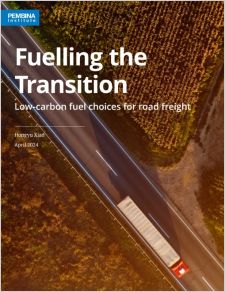
Canada has entered a transition period, moving away from fossil fuel powered vehicles in favour of electric ones. With the gradual winding down of the internal combustion era, fleet owners and operators are planning and making sizable investments to decarbonize their road freight inventory. The combination of pending regulations, total cost of operations, and environmental targets are causing operators to begin a shift to low- and zero-emission vehicles.
To reduce uncertainties and assist owners and operators in making sound investment decisions, the Pembina Institute analyzed the role of clean fuels as a viable means of decarbonizing gas or diesel-fuelled medium- and heavy-duty vehicles (MHDVs).
We studied four fuels in particular: biodiesel, renewable diesel, renewable natural gas, and hydrogen.
Our assessment shows that:
-
The fastest and most cost-effective means of reducing emissions generated by the MHDV sector is through electrification, which can currently be applied to most vehicle classes. For last-mile delivery trucks/vans and regional-haul vehicles that travel relatively short distances and return to central distribution centres, switching to battery-electric is optimal.
-
Clean fuels will play an important role across the MHDV sector during the transition. During this time, a significant number of MHDVs will continue to be internal combustion, and low-carbon fuels can reduce emissions while enabling operators to continue driving vehicles to end of life.
-
Long term, clean fuels enable at least partial decarbonization in classes of trucks where electrification is not viable (such as long-haul Class 8 rigs).
To maximize the benefits of clean fuel deployment and make sound investment and policy decisions, alternative fuels must be targeted to specific areas and vehicle classes. Any decarbonization pathway that incorporates clean fuels must also factor in the duration of their use. In many instances, low-carbon fuel is best thought of as a temporary measure until an internal combustion vehicle is replaced with an electric one. Within a discrete segment of vehicle categories, however, clean fuels, namely hydrogen, may well be useful over the long term.


